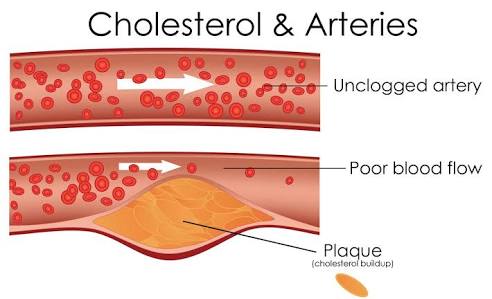High Blood Cholesterol, a yellowish fatty substance, is one of the essential ingredients of the body. Although it is essential to life, it has a bad reputation, being a major villain in heart disease. Every person with a high blood cholesterol is regarded as a potential candidate for heart attack, a stroke or high blood pressure. Cholesterol is a building block of the outer membrane of cells. It is the principal ingredient in the digestive juice bile, in the fatty sheaths that insulate nerves and in sex hormones, namely, estrogen and androgen. It performs several functions such as transportation of fat, providing defense mechanism, protecting red blood cells and muscular membrane of the body. Most of the cholesterol found in the body is produced in the liver. However, about 20 to 30 percent generally comes from the foods we eat. Some cholesterol is also secreted into the intestinal tract in bile and becomes mixed with the dietary cholesterol. The percentage of ingested cholesterol absorbed seemed to average 40 to 50 percent of the intake. The body excretes extra cholesterol from the system through bowels and kidneys. The amount of cholesterol is measured in milligrams per 100 millimeters of blood. Normal level of cholesterol varies between 150- 250 mg. per 100 ml. Persons with atherosclerosis have uniformly high blood cholesterol usually above 250 mg. per 100 ml. In blood, cholesterol is bound to certain proteins – lipoproteins which have an affinity for blood fats, known as lipids. There are two main types of lipoproteins : a low density one (LDL) and a high density one (HDL). The low density lipoprotein is the one which is considered harmful and is associated with cholesterol deposits in blood vessels. The higher the ratio of LDL to the total cholesterol, the greater the risk of arterial damage and heart disease. The HDL on the other hand plays a salutary role by helping remove cholesterol from circulation and thereby reduce the risk of heart disease. Cholesterol has been the subject of extensive study by researchers since 1769, when French chemist, Polutier de La Salle purified the soapy-looking yellowish substance. The results of the most comprehensive research study, commissioned by the National Heart and Lung Institute of the U.S.A. were announced about some years ago. The 10-year study, considered most elaborate and most expensive research project in medical history, indicates that heart disease is directly linked to the level of cholesterol in the blood and that lowering cholesterol significantly reduces the incidence of heart attacks. It has been estimated that for every one per cent reduction in cholesterol, there is a decrease in the risk of heart attack by two per cent. Causes Hypercholesterolaemia or increase in cholestrol is mainly a digestive problem caused by rich foods such as fried foods, excessive consumption of milk and its products like ghee,butter and cream,white flour, sugar, cakes, pastries, biscuits, cheese, ice cream as well as non-vegetarian foods like meat, fish and eggs. Other causes of increase in cholesterol are irregularity in habits, smoking and drinking alcohol. Stress has been found to be a major cause of increased level of cholesterol. Adrenaline and cortison are both released in the body under stress. This, in turn, produces a fat metabolising reaction. Adrenal glands of executive type aggressive persons produce more adrenaline than the easy going men. Consequently they suffer six to eight times more heart attacks than the relaxed men. The Cure To reduce the risk of heart disease, it is essential to lower the level of LDL and increase the level of HDL. This can be achieved by improving the diet and changing the life style.


